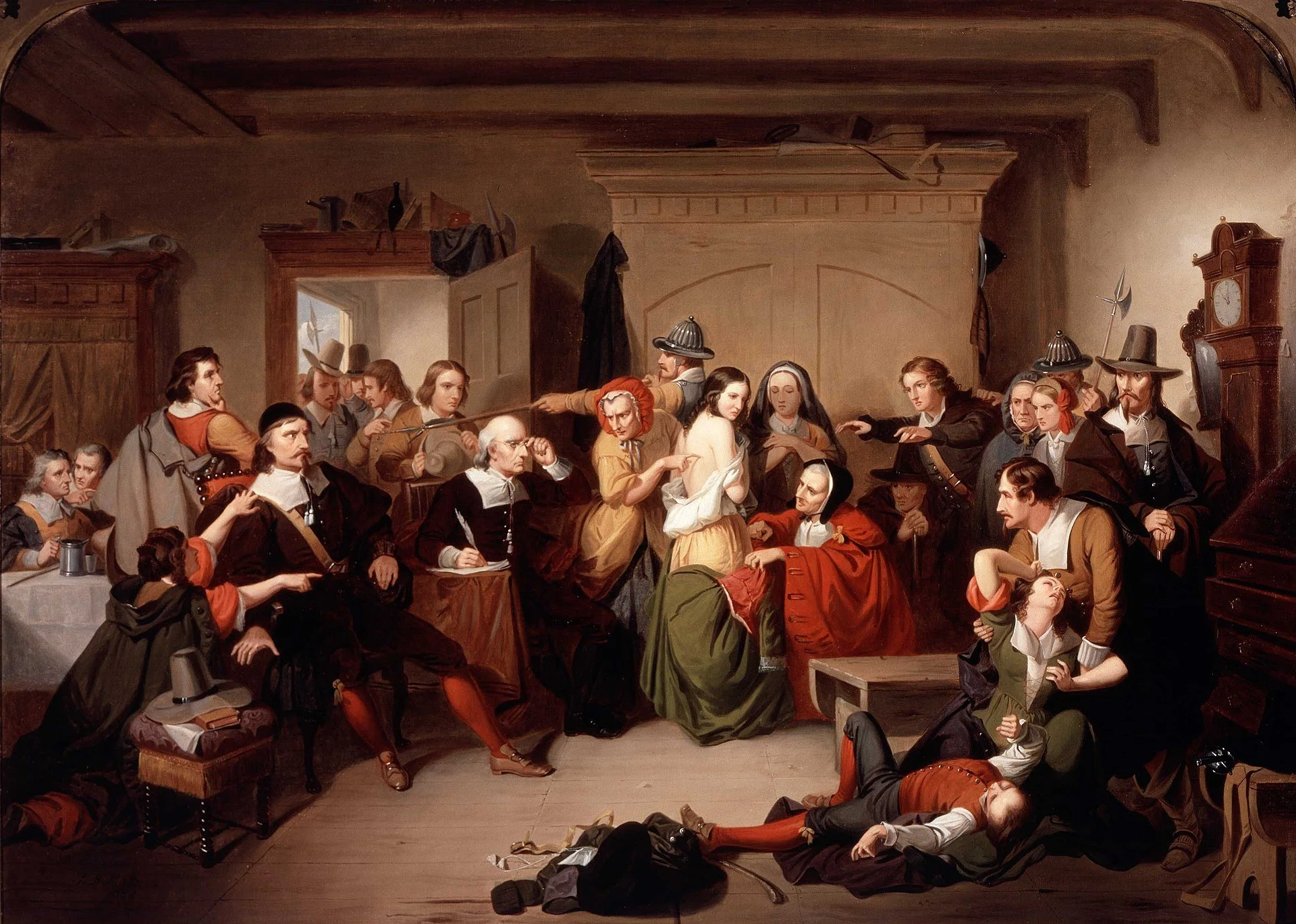
Chris Powell: Remediate Conn.’s present before repudiating its past
At the Salem Witch trials
Connecticut inventor Eli Whitney's (1765-1825) original cotton gin patent, dated March 14, 1794. The invention lead to a huge expansion of slavery and thus to the Civil War.
MANCHESTER
While the new state budget wasn't yet complete, with several big issues waiting to be settled, the other day the state House of Representatives found time to pass a resolution that more or less repudiated and apologized for the conviction and execution of people alleged to have been witches in the Connecticut colony 400 years ago.
Advocates of the resolution said it was needed to assuage the feelings of the distant descendants of the wrongly prosecuted, though if there really are any people with feelings so tender, they need a legislative resolution less than round-the-clock sedation.
For does anyone in Connecticut consider witchcraft convictions from centuries ago to be a mark of shame against anyone alive today?
While the witchcraft resolution was being considered, Connecticut's news was full of reports about matters whose shame is contemporaneous -- like the miserable educational performance of children from racial minorities, the growing violence in the cities, the mental illness and drug addiction of most of the offenders being released from prison, the rise in poverty and homelessness, and worsening social disintegration that suggests the state has become the set of a zombie movie.
The General Assembly has yet to repudiate or apologize for any of those things. For doing something about them would require profound changes in government policy and probably substantial appropriations, even as posturing self-righteously with a resolution of no practical help to anyone is free.
But more discouraging than the legislature's propensity for stupid posturingis the growing presumption that inspired and advanced the witchcraft resolution and inspires other claims for apologies or reparations -- the presumption that the past is so bad that it should shame everyone in the present.
Of course, some shameful things from long ago have present consequences that may be remediable. The disproportionate failure of students from minority groups may be considered the consequence of slavery, though slavery ended 160 years ago. It may be considered the consequence of prejudicial policies that ended 50 years ago, though far more recent policies may be at fault, policies no one in authority cares to question.
In any case the natural order has been for mankind to advance over long periods -- to gain knowledge, wisdom, and decency so that, for example, prosecutions for "familiarity with the Devil" are understood as unjust and based on the superstition and irrational fear inherent in ignorance.
That society improves gradually used to be understood as what was called the ascent of man. Painful as that ascent sometimes has been, ascent it was, and no shame attaches to those who did not participate in old injustices, a point that the opponents of the House resolution on witchcraft tried to make.
Besides, once society begins apologizing for the mistakes of the distant past, there may be no end to it even as its only practical effect will be to provide distraction from the mistakes of the present, just as the witchcraft resolution has done.
xxx
In a desperate attempt to regain ratings a few weeks ago, CNN partnered with former President Donald Trump in televising a public forum in New Hampshire that was packed with Trump supporters while hostile questions were posed to Trump by reporter Kaitlan Collins.
Running for president for a third time, Trump got exactly what he wanted -- another chance to behave outlandishly, call names, and demonstrate the demeanor that has troubled even people who favored some of his administration's policies.
The audience in New Hampshire loved it, providing more evidence that nothing disgraceful, from mere lies to graft to sexual assault, can hurt Trump with his base. As he discovered with happy surprise when he began his first campaign for president in 2016, "I could stand in the middle of Fifth Avenue and shoot somebody and I wouldn't lose any voters."
Trump is the embodiment of the contempt our government increasingly deserves.
Responding to the CNN broadcast, President Biden asked the country: "Do you want four more years of that?" But seeking re-election, the doddering and gaffe-producing Biden, a tool of wokeism, is himself why many people might choose four more years of Trump.
Chris Powell is a columnist for the Journal Inquirer, in Manchester, Connecticut. (CPowell@JournalInquirer.com)
Chris Powell: Feel guilty about the present, not the past
“Examination of a {New England} Witch,” by Tompkins Harrison Matteson (1813-1884), at the Peabody Essex Museum, in Salem, Mass.
The First Meeting House, in Hartford, built in 1635, in the neighborhood where executions for witchcraft took place.
MANCHESTER, Conn.
Guilt tripping through American history has become almost as popular for vacationers as Florida. It's a vacation from current political reality.
In Connecticut the latest guilt trip involves the executions carried out here in the 1600s by the earliest European colonists against 11 of their number accused of witchcraft. The first known witchcraft execution in North America was that of a Windsor woman who was hanged in Hartford in 1647. This was just eight years after the Connecticut colony had distinguished itself more favorably by adopting the Fundamental Orders, a constitution establishing a government and taking more small steps toward democracy.
Until recently Connecticut preferred to remember the heroic virtues of its founders -- their setting out on their own, crossing the ocean, and starting up all over again from nothing. But their failings, even their witchcraft hysteria, are not really cause for the everlasting shame pursued by today's guilt tripping, which takes people and events out of the context of their time and ignores what used to be called the ascent of man, the long and bumpy journey from primitiveness to civilization.
For of course hundreds of years ago people saw the world in a more primitive way, without the understanding provided by modern science and communications. The fear arising from their lack of understanding, combined with the severity of their Puritan religion, made witchcraft seem a plausible explanation for the frequent calamities they suffered, and an accusation of witchcraft quickly became a convenient mechanism for intimidating or expropriating others -- much as accusations of racism are exploited today.
A group called the Connecticut Witch Trial Exoneration Project has been clamoring for a formal acquittal of the victims of the witchcraft hysteria. The state's pardon law can't help because it can be applied only to the living, so maybe it could be amended. Or maybe the General Assembly could pass a resolution of apology.
But why bother? Is there anyone in the state or even the country who has heard of the old witchcraft hysteria and who doesn't know that it was all a horrible misapprehension and injustice and who doesn't either shudder or laugh at it? Could anyone unaware of it come upon it without instantly recognizing it as such?
Meanwhile there are many criminal convictions throughout the country about which serious doubts have arisen, and a far more relevant project, the Innocence Project, has used DNA evidence and other investigation to exonerate hundreds of wrongly convicted people, including some in Connecticut -- people who are still alive and thus in infinitely more need of exoneration than the supposed witches of old. The Innocence Project estimates that as many as 10 percent of prisoners held in the United States are innocent. (Also unjustly, many repeat criminal offenders stalk society because the criminal-justice system fails to put them away for good no matter how much harm they keep doing.)
Many wrongly accused people have been convicted on the basis of false confessions, extracted from them by intimidation and threats by police and prosecutors, just as false confessions were sweated or even beaten out of people accused of witchcraft.
That's why any formal exoneration of the victims of the witchcraft hysteria won't do much more than make people feel guilty about a wrong done long ago for which they bear no responsibility even as it distracts them from current wrongs for which everyone remains responsible.
OUTRAGEOUS INEPTNESS: Connecticut has all sorts of outrages that should be addressed before bothering with the flaws of ancient ancestors. Another such outrage arose three weeks ago in Stonington, where, according to The Day of New London, two municipal public-works employees were caught on surveillance video planting drug syringes in a gazebo in a town park, and doing it on the job, no less.
Police said the employees aimed to create the false impression that the park is overrun by drug addicts and crime.
But Stonington First Selectwoman Danielle Chesebrough says the employees will not be disciplined because their dangerous and deceitful stunt violated no town government policy.
Indeed, all Connecticut often seems to lack a policy ensuring that government serves the public rather than its own employees.
Chris Powell is a columnist for the Journal Inquirer, in Manchester.





